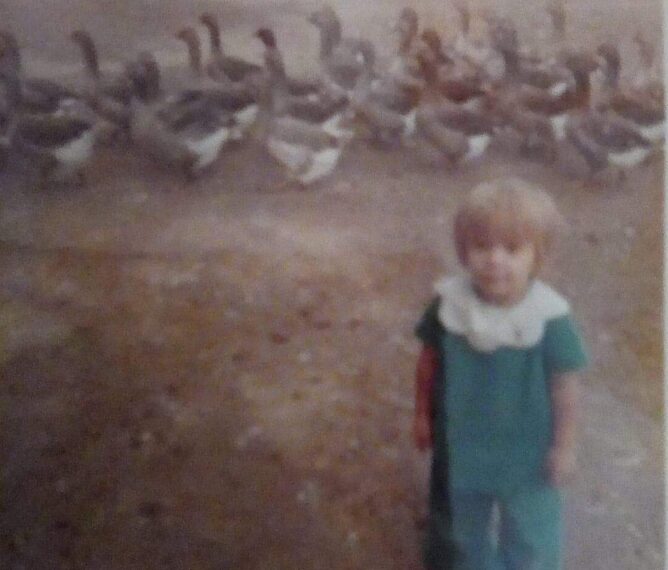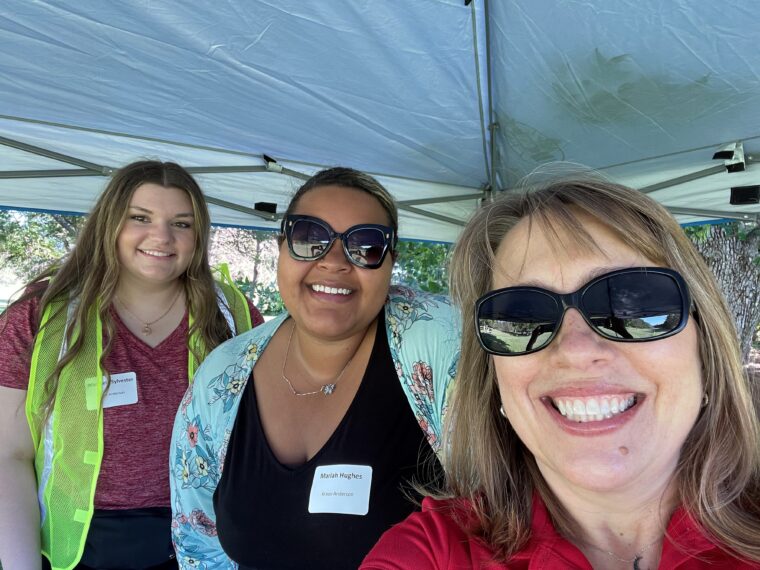Putting It Together: Laurie Trousil, Director of Inclusion and Diversity
By Brenden Nickels, Senior Office Assistant
In this series of articles, I will be writing about employees throughout Kraus-Anderson’s different departments. The idea of these articles is to show how each of our departments works together to help our clients build successful projects — like a puzzle, so to speak. In this first article, I am profiling Laurie Trousil, Director of Inclusion and Diversity.
Nickels: Laurie, tell us a little bit about yourself!
Trousil: Brenden, to understand me a little better I have to take you back a few years. The “Laurie Story” begins in Alexandria, Minnesota on a 25-acre hobby farm. Given I have one brother and the neighborhood was full of boys, I spent much of my time riding 3-wheelers in the woods, building forts, and doing chores such as gardening, cooking/cleaning, and baling hay in the summers. Even though it’s not on my resumé, I can drive a tractor and run a baler.

Nickels: I understand you won an essay contest in high school, can you tell us how that seemingly small thing impacted your life?
Trousil: As a senior, I entered an essay contest and won a trip to the Middle East. The contest was sponsored by a Palestinian women’s group based in Washington D.C., so when we visited Jordan, Israel, and the Occupied Territories, I received a very different perspective on the Arab/Israeli conflict. We toured Palestinian refugee camps, listened to personal histories and hardships, and visited Arab leaders in multiple cities during the first Intifada, which was a very tense time. That experience shaped my future to come.
After getting my bachelor’s degree I knew I needed to go to graduate school. I wanted to be abroad again. Because of my interest in the Middle East, I decided to attend the American University in Cairo, Egypt. My goal was to not only attend a reputable university with the best research library in the Middle East but also to experience living abroad and truly understand the local culture. I distinctly remember getting off the plane in Cairo on a hot June day with two suitcases in my hand, not speaking a word of Arabic, ready to begin my new life.
Nickels: After you graduated, you weren’t yet ready to leave Egypt, right?
Trousil: Nope! I started working at a locally-owned English language school called Orouba (‘clever’ in Arabic). Along with teaching my own class, I supervised the school’s kindergarten program, developing and leading an American-style, centers-based curriculum for 250-300 students each year. All classes were taught in English, except for Arabic, religion (Muslims and Christians had separate courses), and physical education. Some of my fondest memories and best friendships were developed at Orouba. To this day, the biggest compliment I can get is when a former student comes to me saying, “Miss Laurie, you were the best teacher I ever had.”
Living in Egypt shaped who I am today. Like any place, there are goods and bads, pros and cons.
Nickels: But eventually, you had to return home.
Trousil: Ha, yes! After eight years in Egypt, I realized I missed my family and wanted to be closer to them. Basically, I had to start my life over. My diversity career began at a non-profit organization called the MultiCultural Development Center (MCDC), run by Afghan native Dr. Ghafar Lakanwal. We worked with corporations, government agencies, and other entities to consult and educate about differences to make their workplaces more welcoming.
Nickels: How did you end up in a more corporate role and eventually, at Kraus-Anderson?
Trousil: When the economy turned in 2009 – I think we all remember that difficult time – I was laid off from MCDC and transitioned into a corporate diversity role. Since then, I have been fortunate to work in financial services, agriculture, and the medical device industry before coming to Kraus-Anderson. This diverse set of experiences helped me to understand the value of customization: what works in one company or industry may not work in another, especially when supporting global teams.
Nickels: What are some of the biggest changes you’ve seen throughout your career?
Trousil: During my career, I’ve seen a lot of changes in how companies and leaders see and value diversity. This evolution started with compliance, moved to diversity awareness and “doing the right thing,” and now diversity and inclusion are seen as business-drivers for companies who want to be innovative, profitable, and remain competitive in the market. I’ve also seen a significant shift from equality to equity and systems-based thinking as the path to sustainable change.

Nickels: What challenges do you commonly see in the workplace, related to DEI?
Trousil: Having been with Kraus-Anderson for over 4 years now, I think the company is definitely going in the right direction. I’ll never forget the first time I met with CEO Bruce Engelsma and asked him what success might look like for DEI at KA. His response wasn’t about numbers but about people: “KA seeks to cultivate an environment that empowers people.” I still remember this and believe that the key to success starts with both leadership commitment and an inclusive culture. We’ve got that at KA, and then some.
Of course, in every organization, there are always challenges. Frankly, no company has it all figured out. I see that some of the biggest challenges regarding DEI are very human ones:
- It is human nature to gravitate towards people who look like you and with whom you have a trusted relationship, both personally and professionally. It takes intentionality to connect with people who are different from you. Intentionality is the way we are going to develop stronger relationships across differences, as well as build equity in communities that have been historically excluded.
- Many people are afraid to take risks because they are afraid of making mistakes. “What if I say the wrong thing?” or “How do I know which pronouns to use?” or “If I give them the feedback they need, will they think I’m a racist?” Things like ‘Courageous Conversations’ are helping to expose KA’ers to people from different backgrounds and create a safe space to make mistakes and learn. It’s like anything— the more you practice, the better you’ll become.
Nickels: Any advice or parting thoughts?
Trousil: Find or be a mentor. I’ve had so many people that have influenced my life and career, ultimately helping me see different perspectives and be a good mentor myself.
The best career advice I have received from them (in no particular order):
- You have more power than you think to make the changes you want to see.
- The worst thing they can say is “no.”
- Know your value and negotiate for what you’re worth.
- Always remember the Platinum Rule: treat others the way they want to be treated.
- No regrets – understand that you made the best decision you could with the information and wisdom you had at the time.
- At the end of the day, they probably won’t write “Worked at Company XYZ” on your tombstone, so work hard but focus on what really matters.
Putting it all together
Trousil’s job is an exact description of what the “Putting It Together” articles will be about. She describes her contributions to the office by redefining our culture. That is, keeping what’s already working for us, while at the same time, seeing what we can improve upon. This means allowing employees a chance to contribute to our culture, as well as contribute herself.
Trousil’s examples of partaking and improving include, having a positive attitude, being honest, providing feedback so everyone can improve, saying ‘Hello’ to people in the hallways, and when it’s necessary, challenging the status quo.
Of course, when it comes to diversity, there are always some challenges — very human challenges. As Trousil mentioned, it can be hard for us to develop intentionality because it is natural for us to want to be with people who are physically like us. And, the reason some people aren’t willing to take risks is because they are afraid of making a mistake.
Fortunately, Trousil is implementing ways in which KA’ers can change the narrative — ‘Courageous Conversations’, which serve as a practice space for challenging conversations, Small Group Dialogues, and more.
“I feel that every role at KA matters,” Trousil said. “Good work transcends title or position. With my role, I feel that it is important because it will help us to grow into the future, and be a more innovative and profitable company.”
CATEGORY: Diversity